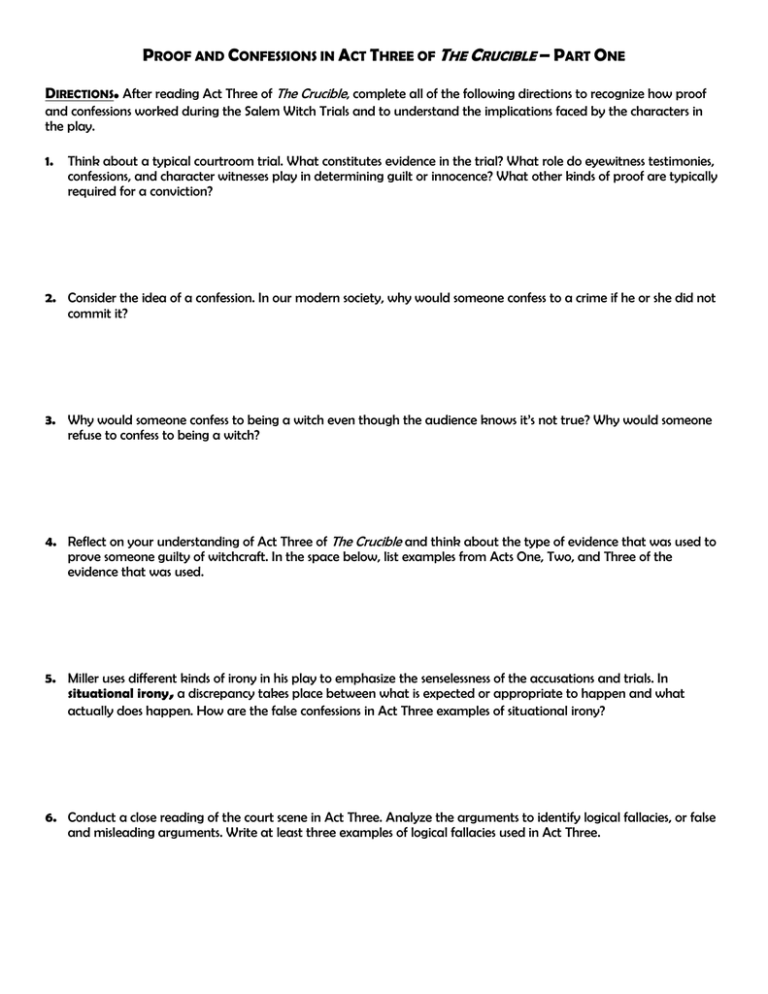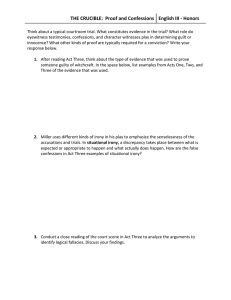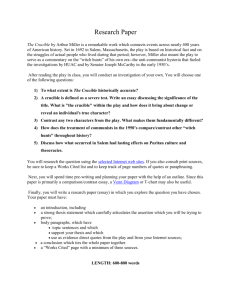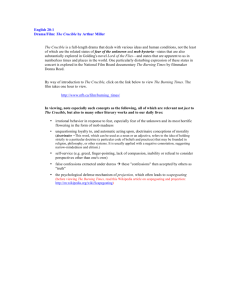The Crucible
advertisement

PROOF AND CONFESSIONS IN ACT THREE OF THE CRUCIBLE – PART ONE DIRECTIONS. After reading Act Three of The Crucible, complete all of the following directions to recognize how proof and confessions worked during the Salem Witch Trials and to understand the implications faced by the characters in the play. 1. Think about a typical courtroom trial. What constitutes evidence in the trial? What role do eyewitness testimonies, confessions, and character witnesses play in determining guilt or innocence? What other kinds of proof are typically required for a conviction? 2. Consider the idea of a confession. In our modern society, why would someone confess to a crime if he or she did not commit it? 3. Why would someone confess to being a witch even though the audience knows it’s not true? Why would someone refuse to confess to being a witch? 4. Reflect on your understanding of Act Three of The Crucible and think about the type of evidence that was used to prove someone guilty of witchcraft. In the space below, list examples from Acts One, Two, and Three of the evidence that was used. 5. Miller uses different kinds of irony in his play to emphasize the senselessness of the accusations and trials. In situational irony, a discrepancy takes place between what is expected or appropriate to happen and what actually does happen. How are the false confessions in Act Three examples of situational irony? 6. Conduct a close reading of the court scene in Act Three. Analyze the arguments to identify logical fallacies, or false and misleading arguments. Write at least three examples of logical fallacies used in Act Three. PROOF AND CONFESSIONS IN ACT THREE OF THE CRUCIBLE – PART TWO DIRECTIONS. After reading Act Three of The Crucible, choose one of the following scenarios and develop a short scene and script for it. Write your script in the space provided. SCENARIO A (needs three characters) You and a friend steal the answer key to a big test. The two of you use the answer key to study the night before. Your friend, who is in a class period before you, gets away with the cheating, but you get caught with a cheat sheet. The teacher tells you that you will receive a “0” on the test, and you will be sent to the principal for possible expulsion if you do not tell who else cheated with you. What will you do? SCENARIO B (needs at least three characters) You donated money to an environmental group last year. You attended one of its meetings six months ago but did not get actively involved. Last week, you heard that a member of the group blew up logging equipment to protest logging in the area. The FBI arrested that person, but it wants to collect the names of everyone involved in the group so that it can prevent further actions. The FBI agent tells you that you have to give him the names of all of the people at the meeting you attended. If you do not give him the names, you will be held in contempt and you could be put in jail until you give him the names. What will you do? SCENARIO C (needs at least two characters) After 9/11, a number of Arab-Americans and other foreign-born citizens and residents were questioned by the FBI. Imagine that you are one of these people. The FBI told you that you would be deported unless you give the names of other Arab-Americans you know, including some of your own family members. If you give the FBI these names, others will find themselves in the same position in which you find yourself. What will you do? SCRIPT FOR SCENARIO ______





